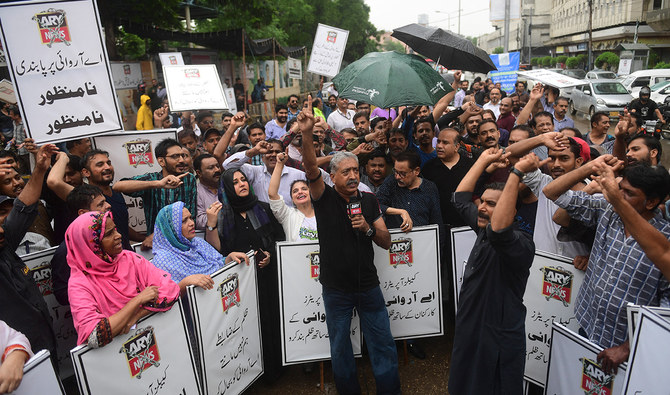ISLAMABAD: The United States said on Tuesday it had ‘concerns’ about press freedom in Pakistan, after the country’s electronic media regulator this week suspended the license of a top television news channel.
Last Sunday, the Pakistan Electronic Media Regulatory Authority (PEMRA) banned the airing of both recorded and live speeches by ex-Prime Minister Imran Khan, accusing him of attacking the state’s institutions and promoting hatred. Ary News, considered a pro-Khan channel, was taken off air on Tuesday for what the regular called its “willful defiance” of the ban.
Pakistan’s electronic media regulator last suspended ARY’s license in August and issued a show-cause notice to the channel for airing “hateful and seditious” content that the authority said amounted to inciting revolt within the armed forces.
“This is an issue that we routinely raise, we routinely raise our concerns about press freedom to stakeholders around the world, including to counterparts and partners in Pakistan,” State Department Spokesperson Ned Price told reporters in response to a question about ARY News being taken off air.
“A free press and informed citizenry are key to any nation and its democratic future. As a general matter, we’re concerned by media and content restrictions that undermine the exercise of freedom of expression, peaceful assembly, and association.”
Responding to the ban on broadcasting speeches of Khan and the suspension of the transmission of Ary News, Amnesty International on Tuesday called the restrictions a “disturbing demonstration of how successive Pakistani authorities target critical voices and use the country’s media regulatory authority to threaten press freedom.”
This is the third ban on broadcasting and rebroadcasting of Khan’s speeches and press talks on all satellite TV channels in Pakistan since he was ousted from power in a parliamentary vote on no-confidence Last April.
“Overbroad use of bans on news and media publications constitutes a violation of the right to freedom of expression,” Amnesty said.
“Criticism of state institutions cannot be considered hate speech as has been suggested by PEMRA. Any limitations on the right to freedom of expression must be on a case-to-case basis and deemed to be necessary and proportionate conforming to international human rights laws and standards.”

























